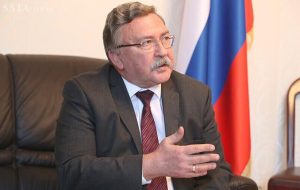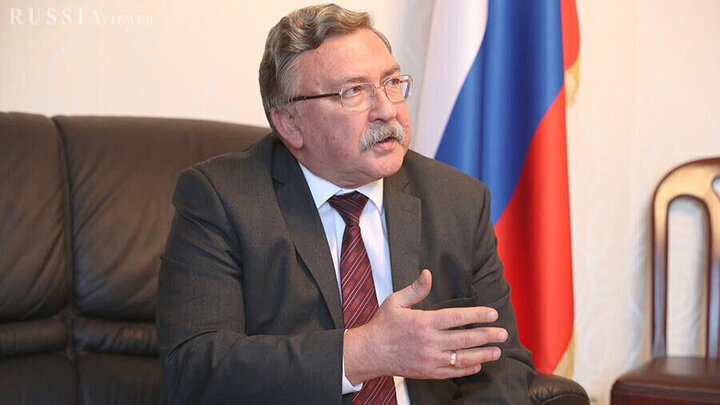West abandoned JCPOA revival talks in 2022 despite near-agreement, Ulyanov tells Tehran Times
TEHRAN – For those who have closely tracked the Joint Comprehensive Plan of Action (JCPOA), Mikhail Ulyanov is a well-known name. As Russia’s Permanent Representative to international organizations in Vienna, Ulyanov played an active role in the multiple rounds of negotiations between JCPOA signatories aimed at salvaging the deal after the U.S. unilaterally withdrew in


TEHRAN – For those who have closely tracked the Joint Comprehensive Plan of Action (JCPOA), Mikhail Ulyanov is a well-known name. As Russia’s Permanent Representative to international organizations in Vienna, Ulyanov played an active role in the multiple rounds of negotiations between JCPOA signatories aimed at salvaging the deal after the U.S. unilaterally withdrew in 2018 and reimposed sanctions on Iran.
In an interview with the Tehran Times, the Russian official said the remaining signatories to the 2015 nuclear deal (Iran, Russia, China, France, Germany, and Britain) were about to reach an agreement on the revival of the pact before Europe left the talks in coordination with Washington in 2022. He believes Europeans are not the key players here and whether the JCPOA can be saved or not depends on the actions of the United States.
Ulyanov did not specify the reasons behind the West’s decision to scuttle the deal’s restoration. However, the timing of the Western states’ departure from the negotiating table occurred when Iran was facing domestic unrest and riots.
Below is the full text of Ulyanov’s interview with the Tehran Times:
What is the current status of negotiations on the JCPOA?
The JCPOA negotiations stopped in 2022, just the moment when they were at the finish line. All that was left was to agree on just a handful of provisions. The Western countries, namely the United States, Germany, France, and the UK, decided to abandon the process of finalization of the «package» decision, while Russia, Iran, and China were ready to do it.
As far as we understand, recently there has been a resumption of informal contact between representatives of Iran with political directors of foreign services of Germany, France, and the UK, as well as with representatives of the European External Action Service, which used to play the role of the JCPOA negotiations’ coordinators. We see that these contacts are preliminary in nature, an informal dialogue that is far from real negotiations. Moreover, it is clear that the European countries are not and cannot be
Do you think Russia has played a role in facilitating a successful outcome?
Russia played a considerable role during the 2021–2022 negotiations on the restoration of the JCPOA. We genuinely made a maximum effort to achieve an outcome. Answering your question, I think I can say that at that time all the participants of the process – Iran, China, E3, the U.S. as well as the EU assessed Russia’s contribution very positively. Indeed, on many occasions, we were able to propose certain compromise solutions that found unanimous support and allowed us to move forward.
What are the key challenges remaining in reviving the Iran nuclear deal?
I believe that the key challenge in that regard is the lack of readiness of the Western countries to resume negotiations at this stage. In many ways, the Western countries became hostages of their own political agenda. They were not able to appropriately take into account legitimate suggestions and requests of the Iranian side. They keep resorting to unreasonable politicization of the issue and regularly undertake not just provocative, but completely irrelevant actions against Iran. A clear example of that would be these countries’ behavior at the IAEA Board of Governors in Vienna with politically inadequate anti-Iran resolutions.
What are the implications of the JCPOA for regional security and stability?
In my view, the JCPOA had positive implications for regional security and stability in the period of 2015–2018 – before the unilateral withdrawal of the United States in 2018. Timely resumption of the JCPOA in full could have undoubtedly become one of the factors contributing to restoring stability in the region.
Are there any potential avenues for future cooperation on the issue?
As of today, nobody has an answer to this question. The position of the United States remains unclear, specifically regarding whether it will acknowledge that its withdrawal from the JCPOA and imposition of the ‘maximum pressure’ campaign led to outcomes directly opposite to those it had been counting on. It remains to be seen whether the White House is willing to look for a political solution and reasonable balance of interests, without which it would be impossible to expect a positive result. One can probably expect that the situation will become clearer in 2-3 months. However, what has to be taken into account while addressing this issue, is that October 18, 2025, marks the expiration of the JCPOA and the UN Security Council Resolution 2231 timelines.
